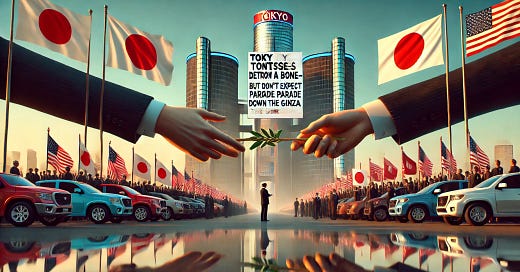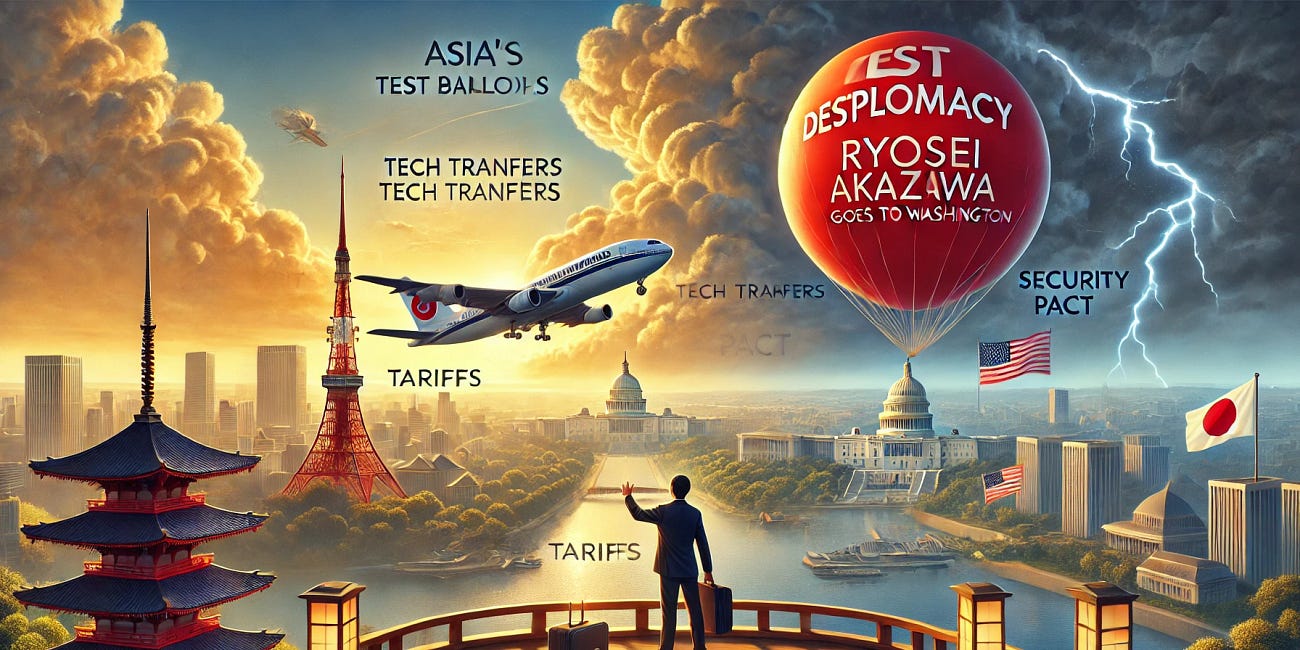Tokyo Tosses Detroit a Bone — But Don’t Expect a Motor City Parade Down the Ginza
It’s not about who makes the better power plant or who’s cheaper. It’s about who’s local, who’s trusted, and who brings prestige to the block
Just as I was settling in to prep the week ahead, a headline with perfect diplomatic optics popped: “TOKYO EYES EASING RULES FOR AMERICAN CAR IMPORTS: NIKKEI.” Now, I’m not trying to be overly cynical here, but we flagged this exact move back on April 16 — and why it’s more about flash than function. So sure, go ahead and buy Detroit for the day if you want, but don’t go betting your book on a GM renaissance because Tokyo's tweaking some safety regs or shaving a tariff.
If anything, this headline might have Tesla’s name on it more than anyone else's, as Japan doesn’t produce great EV’s. And let’s be real — Tokyo isn’t stupid. They know how to feed the optics machine without giving up real ground. Toss a bone here, drop a headline there, smile for the camera, and keep the domestic auto fortress sealed tight where it counts.
Having lived and worked in Tokyo, I’ll spell it out: hometown favoritism beats purchasing power parity every time. It’s not about who makes the better truck or who’s cheaper. It’s about who’s local, who’s trusted, and who brings prestige to the block. And when it comes to playing the long game, Tokyo will always back the hometown hero — wrapped in a bow, nodded through bureaucratically, and sold as a concession.
But zoom out. Treasury Sec Scott Bessent has already said this isn’t just about Toyotas and rice bowls — this is a multi-front negotiation play. We’re talking non-tariff barriers, currency management, subsidy alignment, the whole arsenal. The autos are just the icebreaker.
So what’s the trade? A Japan deal — in some form — is already 80% priced in. The market’s sniffed this out for weeks. And as we say on desks across the globe: the more obvious the conclusion, the more likely it’s already in the tape. This headline is tidy, but it ain’t alpha.Sure, maybe you can buy Detroit on the day — but don’t count on a GM renaissance, and definitely don’t expect a Chevy Silverado HS 5500 parading down the Ginza.
Contrary to public opinion — and some political soundbites — might suggest, Japan’s tariff on imported passenger vehicles has been zero for decades. That’s right: 0%. On paper, it’s a wide-open market. No tariff wall, no duty choke point. Foreign automakers should be flooding in, right?
Except they’re not. And that’s the point.
The real barriers in Japan aren’t the kind you see on a customs slip — they’re baked into the system through non-tariff measures, bureaucratic speed bumps, domestic preferences, and dealership gatekeeping. This isn’t a tariff fight — it’s a structural moat dressed up as a level playing field.
So when Tokyo tosses out a headline about “easing import rules” for American cars, the actual tariff policy isn’t what’s in play. It’s everything around it — regulatory standards, emissions protocols, model approval timing, and distribution access. That’s where the resistance lives. And it’s why, despite the zero-tariff, Detroit's footprint in Japan is still a rounding error.
Asia’s Test Balloon Is About to Launch : Ryosei Akazawa Goes To Washington
Japan’s top brass is landing in D.C., and make no mistake: this isn’t just another round of handshake diplomacy. It’s a high-stakes stress test of Trump’s new world order in trade. The team, led by economic revitalization minister Ryosei Akazawa — a close Ishiba ally — is gunning for a “win-win” deal. But let’s be real: Tokyo’s not walking into a level …




